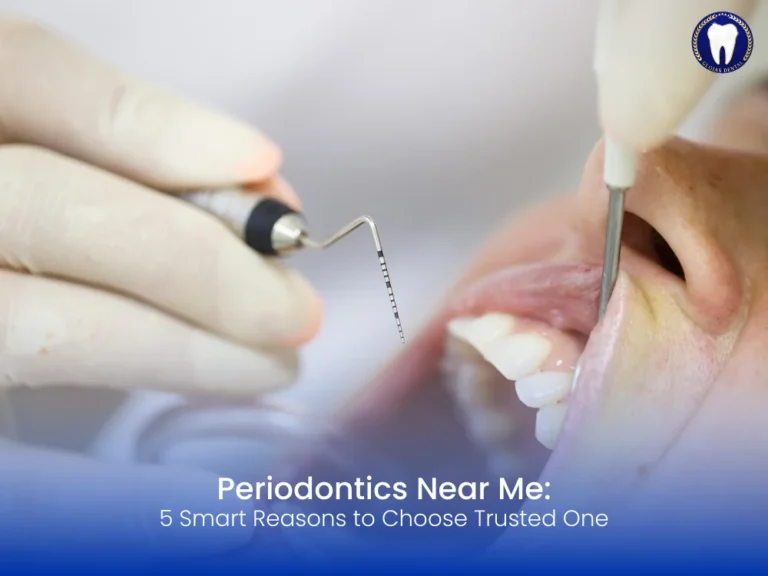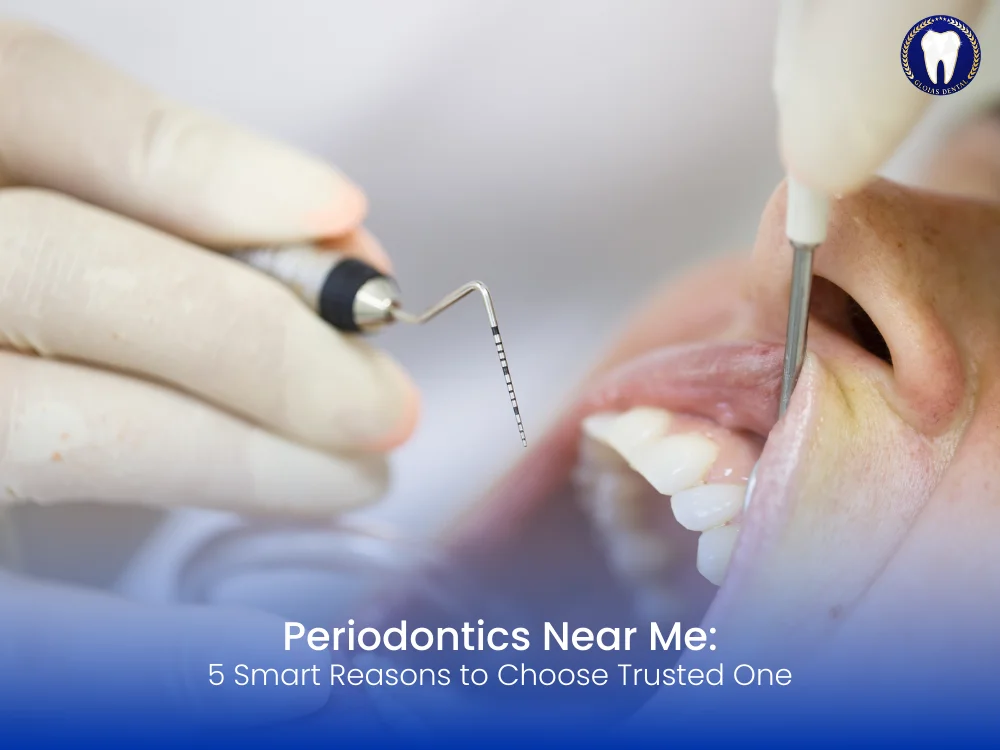If you’ve ever searched for “periodontics near me,” chances are you’re experiencing gum issues or seeking a specialist for long-term oral health. Periodontics is the dental specialty focused on preventing, diagnosing, and treating gum disease as well as placing dental implants.
Finding reliable periodontics near me isn’t just about convenience—it’s about ensuring you receive expert care that preserves your teeth, gums, and overall health.
In this guide, we’ll uncover why choosing skilled local periodontists matters, what to expect from treatment, how to pick the right provider, and what costs might be involved.
What Does a Periodontist Do?
A periodontist specializes in the supporting structures of the teeth, including:
- Gums
- Alveolar bone
- Periodontal ligament
They treat conditions such as:
- Gingivitis and periodontitis
- Gum recession
- Loose teeth
- Bone loss around teeth
- Dental implant placement and care
When your general dentist refers you to a specialist, they likely recommend “periodontics near me” for complex gum issues that require advanced expertise.
Top Benefits of Choosing Local Periodontics Near Me
Convenient Care Coordination
Choosing a local periodontist means easier coordination with your general dentist. Most practices in the same region often collaborate for better continuity of care.
Personalized Follow-Up Appointments
Gum treatments often require multiple visits. Having periodontics near me ensures follow-ups, check-ins, and urgent visits are more manageable.
Faster Access to Emergency Gum Treatments
Severe gum infections or complications from implants require immediate attention. A local specialist can provide urgent care without long waits.
Familiarity with Local Dental Networks
Local providers are often part of trusted dental networks. This improves insurance processing, referrals, and care standards.
Common Conditions Treated by Periodontists
Gum Disease (Periodontitis)
This is the most common reason people search for “periodontics near me.” Advanced gum disease can lead to tooth loss and systemic health issues if not treated by a specialist.
Gum Recession
If your teeth appear “longer” than before, you might have gum recession—a problem that exposes tooth roots, causing sensitivity and risk of decay.
Dental Implant Placement
Many periodontists are highly trained in dental implant surgery, ensuring the success and longevity of implants.
Crown Lengthening and Bone Grafting
These are often needed before cosmetic or restorative procedures and are typically done by periodontists.
Signs You Should See a Periodontist Immediately
- Bleeding gums during brushing or flossing
- Chronic bad breath
- Loose teeth or shifting bite
- Swollen or red gums
- Pus around the gums or teeth
- Painful chewing
If you’re experiencing any of the above symptoms, searching for “periodontics near me” could lead to early detection and prevention of serious oral issues.
How to Choose the Right Periodontics Near Me
Look for Board Certification
Certified periodontists undergo advanced training beyond dental school. Ensure your specialist is certified by the American Board of Periodontology or relevant authority in your country.
Read Reviews and Patient Testimonials
Real experiences offer insight into a provider’s bedside manner, effectiveness, and clinic cleanliness.
Evaluate Clinic Technology
Top clinics use advanced imaging tools, laser treatments, and regenerative procedures. Check if your chosen periodontics near me clinic is equipped with such technologies.
Insurance and Payment Options
Check if the clinic accepts your dental insurance and offers flexible payment plans.
Accessibility and Appointment Availability
Is the clinic easy to reach from your location? Do they offer early morning or evening appointments? These practicalities matter.
What to Expect During a Periodontic Visit
Your first visit typically includes:
- A full periodontal evaluation
- Measurement of gum pockets
- Dental imaging (X-rays or CBCT scans)
- Review of medical history
Based on this assessment, your periodontist will recommend a treatment plan tailored to your condition.
Common Periodontal Procedures and Costs
Procedure | Average Cost (USD) | Covered by Insurance |
Scaling and Root Planing | $150 – $300/quad | Partially |
Laser Gum Therapy | $500 – $1,000 | Sometimes |
Dental Implant Placement | $3,000 – $6,000 | Partially (crown separate) |
Bone Grafting | $400 – $1,200 | Partially |
Gum Grafting | $600 – $1,200 | Partially |
Note: Prices vary based on location and severity of the condition.
Risks of Delaying Periodontal Treatment
Ignoring gum symptoms or delaying care can lead to:
- Permanent tooth loss
- Jawbone deterioration
- Increased risk of heart disease, diabetes, and stroke
- Higher costs for restorative procedures later
Early intervention saves not only your teeth but also your overall health and finances.
Advanced Technologies in Periodontics Near Me
Top periodontal clinics often use:
- LANAP (Laser-Assisted New Attachment Procedure)
- 3D imaging for precise diagnosis
- Digital periodontal charting
- Regenerative procedures with growth factors
Ask your local provider what technologies they offer to improve patient outcomes.
Long-Term Care Tips After Periodontal Treatment
- Maintain regular cleanings every 3 to 4 months
- Use a soft-bristled electric toothbrush
- Rinse with antimicrobial mouthwash
- Avoid tobacco and limit sugar intake
- Follow personalized oral hygiene instructions from your specialist
Frequently Asked Questions FAQs
1. What is periodontics near me used for?
It helps treat gum disease, perform implant surgery, and correct issues related to gum and bone health.
2. Is it better to see a periodontist or a dentist for gum disease?
General dentists can treat mild cases, but periodontists are the go-to experts for moderate to severe conditions.
3. How often should I visit a periodontist?
After treatment, most patients need periodontal maintenance every 3–4 months.
4. Are periodontics near me covered by insurance?
Many procedures are partially covered under dental plans. Check with your provider for exact details.
5. Can gum disease be reversed?
Early-stage gum disease (gingivitis) can be reversed, but advanced periodontitis needs ongoing management.
6. Do I need a referral to see a periodontist near me?
Not always. Many specialists accept direct appointments without referrals.

